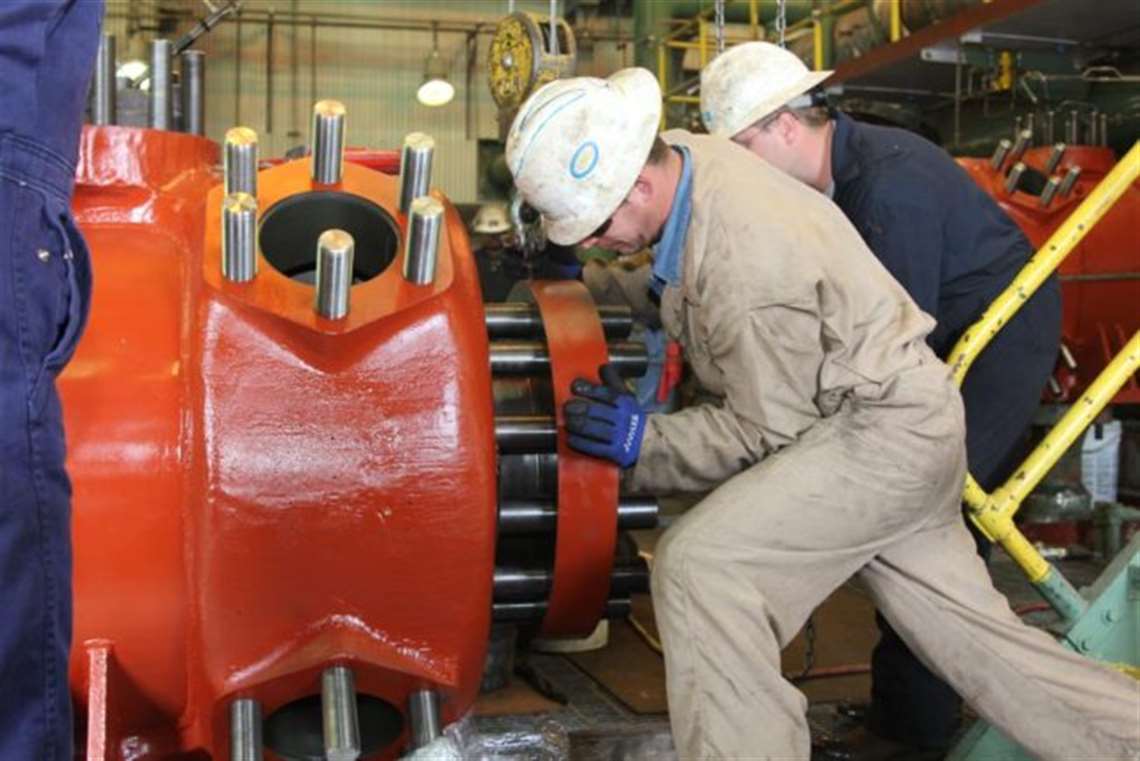Back From The Brink Of Bankruptcy
10 April 2017

This article was originally published in the March issue of COMPRESSORtech2. Subscribe for free to receive every issue in your mailbox or your inbox.
In 2014, Compressor Engineering Corp. (CECO) was celebrating 50 years of business when senior management learned there were severe financial problems that threatened the company with imminent bankruptcy.
“On Aug. 13, 2014, I thought I was going to have to find another job,” said Richard Hotze, now president and chief operating officer of CECO.
It all came to a head with the Pipeline Services division trying to grow business with new pipeline construction in Ohio and Pennsylvania, the Marcellus shale region of the U.S. “There were cost overruns that were buried in new jobs,” Hotze said. “The numbers were all hidden in the complicated accounting of pipeline construction.
“We wake up one day and find out we’ve got new projects, but we’ve already spent all the money and haven’t started any work. We were told they were 95% complete. We billed 95%, but we were only 40% complete. The people we had
hired to run that for us were just dishonest. By the time we found out the level of dishonestly, it was too late.”
Construction destruction
CECO’s pipeline construction group was an offshoot of its successful Pipeline Services division, one of two operating divisions, the other being Product Manufacturing. Pipeline Services performs maintenance and repairs on existing pipelines, including recoatings, anomaly digs, wraps and cutouts.

Hotze said new pipeline construction was a natural extension of the business because of the many similarities to pipeline maintenance, but there are significant differences, and the business was not managed correctly.
CECO found itself committed to millions of dollars in projects without the resources to complete them. Nevertheless, Hotze and his team made the commitment to fulfill their obligations. “At the end of the day, we had to make good on all the jobs. We had to finish the jobs and save our reputation,” Hotze said. “We dug ourselves deeper in the hole until it was settled. We had some management changes and we hired a chief restructuring officer for about a year to put together a plan.
“We basically put a ring around Ohio and Pennsylvania and came to settlement with all our vendors in Ohio. We shut down our Ohio operations; we finished our work and shut it down. We got rid of the entire pipeline construction business and retreated to what we do best.” Instead of taking on jobs to lay 20 mi. (32 km) of 20 in. (50.8 cm) pipe, for example, CECO concentrated on specialized jobs, like a 0.25 mi. (0.4 km) take up and relay of 36 in. (91.4 cm) pipe.
Valves make the switch
The realignment of the Pipeline Services business back to it’s successful core was critical to repairing the damage done to CECO, but the Product Manufacturing side of the business had a huge impact between 2014 and 2016 as well.
During that time, most upstream activity all but stopped due to low global oil prices, but pipeline activity increased in North America to meet demand for cheap natural gas. Hotze said 15% of CECO’s business is upstream, but the majority is midstream. “Long-haul transmission saved our bacon,” he said.
The company manufactures and sells compressor valves, valve actuators, deactivators, pistons, piston rods, packing cases, packing sets, volume pockets and more into the compression industry. It also offers repair services for compressor cylinders, power cylinder heads, pistons, piston rods and related equipment.
CECO’s expertise includes project engineering. “Our middle name is Engineering,” Hotze said. “We’ve got a staff of engineers that design-build. Project engineers will calculate how to reline a cylinder, send crews out to reline them and put new compressor valves on them. We’ll work out how much deactivation they’re going to need to run these configurations. We then design and build the deactivation equipment to go on top of the compressors.”
CECO’s emissions-testing services include portable emissions laboratories and help with filing documentation with state regulatory agencies. Courses offered through the company’s training division include compressor fundamentals and advanced analytics using the company’s own textbooks.
But when most people think of CECO, they think of compressor valves.
“We’re known as a valve company,” Hotze said. “Of all the poppet valves that are installed in natural gas pipelines, I would dare say that 70% or more were manufactured in our Houston facility. We replaced most of the plate valves in natural gas pipelines — long-haul, interstate pipelines with poppet valves. Interstate pipelines are about 75% of our compression parts business.”

Reversal to the rescue
Only days after CECO fully grasped the problems they faced in 2014, a redeeming opportunity presented itself.
“Aug. 15, I was looking for another job,” Hotze said. “Then on Sept. 5, we met with the southeast mainline project team from TransCanada. They said they had a US$698 million project and needed our help.
“The market changed on us in a good way. Gas has always moved from the Gulf Coast to the Northeast — from the source to the major markets. With the shale gas boom in the Marcellus, gas began to move from the north to the south to the gas liquefaction plants.”
The pipeline reversals meant that many compressors needed to have their cylinders resized, replaced or renewed. “Going north, they have one set of conditions; going the other direction, they are different,” Hotze said. This created a huge opportunity for CECO.
Hotze said the first to begin pipeline reversal projects was TransCanada. “TransCanada hired us to help them design their turnaround program,” Hotze said. “Everything from selecting vendors, providing project management, engineering support, site visit scheduling for vendors, determining long-lead-time items and providing warehousing and logistics for those items.”
TransCanada planned to zero-hour 44 large-bore gas engines and return them to like-new status. More than a year into the three-year project, the scope has been scaled back to 29 Clark, Worthington, Ingersoll Rand and Cooper-Bessemer integral engine-compressors.
But between the TransCanada project and big reversal jobs from other major pipeline companies, there was more than enough work to pull CECO out of the mire.
Award-winning turnaround
“From the compressor and engine parts side, we were able to help save the business,” Hotze said. “We sold a lot more parts because of the turnarounds of the pipelines. Demand for parts skyrocketed.
“We discovered a way out. We told the banks to chill. In December, the pipelines began placing significant orders, chewing up a bunch of industry capacity, so it was good for everyone.”
The company was recapitalized, and what resulted was the two best years of financial results in the company’s history. Today, CECO is poised to have its most profitable fiscal year ever and record-breaking earnings.
In 2016, CECO was awarded the Turnaround of the Year by the Turnaround Management Association (TMA) Chicago/Midwest chapter, a testament to just how far the company has come since those dark days in 2014.
“It was a stellar turnaround,” Hotze said. He gives credit to the leadership team who helped turn the company around, saying he is grateful to associates, customers and vendors for their loyalty through a difficult time.
To read about CECO’s founding, click here.
MAGAZINE
NEWSLETTER
CONNECT WITH THE TEAM





